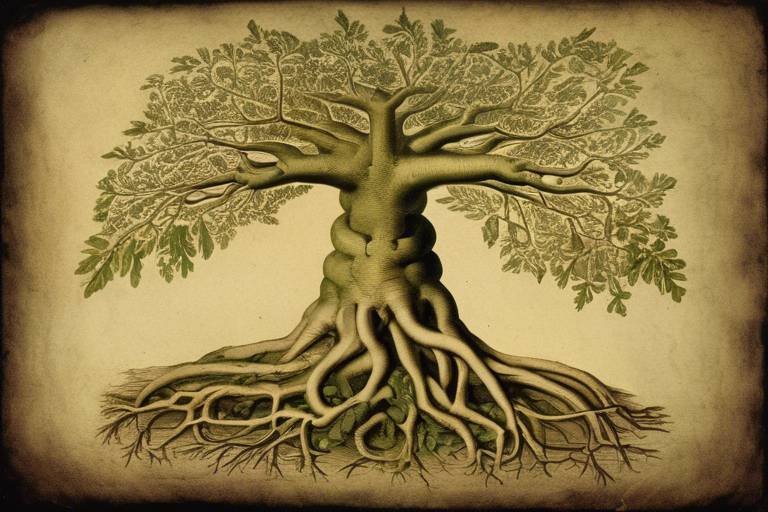Philosophy and Botany – The Intertwining Roots
Have you ever paused to consider how deeply intertwined our understanding of the natural world is with our philosophical inquiries? The relationship between philosophy and botany is not merely academic; it’s a rich tapestry woven from the threads of inquiry, ethics, and the very essence of life itself. Imagine standing in a lush garden, surrounded by vibrant plants, each one whispering stories of existence and thought. This article embarks on an exploration of how these two fields influence one another, revealing insights that can transform our perception of both nature and our place within it.
At its core, botany is the scientific study of plants, but it doesn't exist in a vacuum. The philosophical underpinnings that guide our understanding of plants shape the methodologies we use and the questions we ask. For instance, consider the concept of essentialism, which posits that entities have a set of attributes necessary to their identity. In botany, this leads to inquiries about the fundamental characteristics that define a plant species. Similarly, teleology, the idea that natural phenomena have inherent purposes or goals, prompts botanists to explore the roles that different plants play within ecosystems. Thus, the philosophical foundations of botany not only inform scientific practices but also enrich our understanding of the natural world.
Moreover, the imagery of plants often serves as a profound metaphor in philosophical discourse. When philosophers discuss concepts like growth, interconnectedness, and the essence of life, they frequently draw upon botanical analogies. Just as a plant grows towards the light, seeking nourishment and sustenance, so too do our ideas and beliefs evolve in response to the world around us. This metaphorical use of botany enhances our discussions, inviting us to reflect on the interconnectedness of life and the philosophical implications that arise from it.
As we delve deeper, we find that the interconnectedness seen in botanical ecosystems mirrors broader philosophical themes about existence and relationships. For instance, consider the intricate web of life within a forest, where each plant, animal, and microorganism plays a vital role. This ecosystem not only sustains itself but also reflects the philosophical idea that all beings are interconnected. Just like the roots of trees intertwine beneath the surface, our thoughts and beliefs are often linked in ways we may not immediately recognize. This interconnectedness challenges us to think critically about our place in the world and the relationships we cultivate with other living beings.
In the realm of ecological philosophy, the insights gained from botany can inform our understanding of ecological relationships and ethical considerations surrounding biodiversity conservation. As we grapple with the realities of climate change and habitat destruction, the lessons learned from the study of plants can guide us toward more sustainable practices. For instance, recognizing the value of diverse plant species not only enriches our ecosystems but also serves as a reminder of our moral responsibilities toward preserving the natural world.
Furthermore, the symbolic significance of various plants in philosophical texts illustrates how they represent complex ideas about human existence and morality. From the olive branch, symbolizing peace, to the lotus flower, representing purity and enlightenment, plants have long served as powerful symbols in our quest to understand life’s intricacies. This symbolism invites us to reflect on our values and the ethical implications of our actions in the world.
In conclusion, the interplay between philosophy and botany reveals a profound relationship that enhances our understanding of both fields. By examining the philosophical foundations of botanical studies, we gain insights into the nature of scientific inquiry and the ethical considerations that arise from our interactions with the natural world. As we continue to explore this rich tapestry of ideas, we are reminded that our relationship with nature is not merely one of observation but an ongoing dialogue that shapes our beliefs and actions.
- How does philosophy influence botanical research?
Philosophy provides the foundational concepts that guide scientific inquiry, shaping the questions researchers ask and the methodologies they employ. - What role do metaphors play in philosophical discussions?
Botanical imagery serves as a powerful metaphor for complex ideas, helping to enrich and deepen philosophical discourse. - Why is interconnectedness important in ecology?
Interconnectedness highlights the relationships between different life forms, emphasizing the need for biodiversity and ethical responsibility in conservation efforts. - How can understanding plant symbolism enhance our ethical considerations?
By recognizing the symbolic significance of plants, we can reflect on our values and the moral implications of our actions toward the environment.

The Philosophical Foundations of Botany
When we think about botany, we often envision the meticulous study of plants, their structures, and their ecosystems. However, beneath this scientific surface lies a rich tapestry of philosophical thought that has profoundly influenced the way we understand and study the botanical world. Philosophy and botany are not merely parallel disciplines; they are intertwined roots that nourish each other, shaping our perceptions of life, growth, and the natural order.
One of the most significant philosophical concepts that has shaped botany is essentialism. This idea posits that every entity has a set of attributes that are necessary to its identity. In botany, this translates to the classification of plants based on their inherent characteristics. For instance, consider the way we categorize flowering plants versus non-flowering ones. Essentialism encourages botanists to seek the fundamental traits that define each species, fostering a deeper understanding of biodiversity. Yet, it also raises questions: Are these classifications merely human constructs, or do they reflect an objective reality in nature?
Another pivotal concept is teleology, which examines the purpose or end goals of natural phenomena. In the context of botany, this leads us to ponder the reasons behind a plant's growth patterns, reproductive strategies, and survival mechanisms. Why do some plants develop thorns, while others produce vibrant flowers? Teleological thinking invites botanists to consider not just how plants function, but why they have evolved in particular ways. This philosophical inquiry can lead to profound insights about the interconnectedness of ecosystems and the roles various species play within them.
The nature of scientific inquiry itself is also deeply philosophical. The methodologies employed in botanical research often reflect underlying philosophical assumptions about knowledge, truth, and evidence. For example, the debate between reductionism and holism in scientific approaches can be traced back to philosophical discussions about the nature of reality. Is it more valuable to study plants in isolation, or should we consider their relationships within the ecosystem? This question is not just scientific; it is fundamentally philosophical, influencing how research is conducted and interpreted.
In summary, the philosophical foundations of botany are rich and complex. They challenge us to think critically about the nature of life and our place within it. As we delve deeper into the study of plants, we uncover not only the intricacies of their biology but also the profound philosophical questions that arise from our attempts to understand them. This interplay between philosophy and botany invites us to engage in a dialogue that enriches both fields, fostering a holistic appreciation of the natural world.
- What is essentialism in botany? Essentialism is the philosophical idea that entities have a set of characteristics that define their identity, influencing how botanists classify and understand plant species.
- How does teleology relate to botany? Teleology examines the purpose behind natural phenomena, prompting questions about why plants have evolved certain traits and how they function within ecosystems.
- Why is the philosophy of scientific inquiry important in botany? The philosophy of scientific inquiry shapes the methodologies used in botanical research, influencing how we study and interpret plant life.

Botany as a Metaphor in Philosophy
When we think about philosophy, it often conjures images of deep thinkers pondering the nature of existence, ethics, and the universe. But did you know that the world of botany—the study of plants—provides a rich tapestry of metaphors that philosophers have drawn upon for centuries? Just like a tree with its intricate network of roots, branches, and leaves, the connections between botany and philosophy are both profound and multifaceted. In this section, we’ll explore how botanical imagery and concepts serve as powerful metaphors in philosophical discourse, enriching our understanding of growth, interconnectedness, and the very essence of life itself.
One of the most striking ways in which botany influences philosophical thought is through the concept of growth. Think about it: growth is not just a physical process for plants; it symbolizes personal development and the journey of self-discovery in human beings. Just as a seed must break through the soil to reach the sunlight, individuals often face challenges that force them to evolve and grow. Philosophers like Friedrich Nietzsche have likened personal growth to the process of a plant reaching for the sun, emphasizing the struggle and resilience required to thrive. This metaphor serves as a reminder that growth often comes with its share of difficulties, and it’s through overcoming these obstacles that we truly blossom.
Moreover, the idea of interconnectedness in botanical ecosystems mirrors broader philosophical themes about existence and relationships. Just as plants depend on one another for nutrients, sunlight, and pollination, humans are also deeply interconnected, relying on each other for emotional support, knowledge, and community. This notion of interconnectedness is beautifully captured in the philosophy of Martin Buber, who emphasized the importance of relationships in defining our humanity. In his view, the “I-Thou” relationship reflects the way plants interact within their ecosystems, suggesting that our connections with others are what truly enrich our lives.
To delve deeper, let’s consider the philosophical implications of interconnectedness in nature. Ecosystems are delicate webs of life, where each species, from the tiniest microbe to the tallest tree, plays a vital role. This intricate balance reminds us of the philosophical idea that all beings are interdependent. When we harm one part of the ecosystem, we risk damaging the entire system. This idea resonates with the ethical considerations in environmental philosophy, where the health of our planet is seen as a reflection of our moral responsibilities toward it. Just like the roots of a plant intertwine with the soil, our actions are deeply rooted in the broader context of existence.
Ecological philosophy takes this interconnectedness a step further, emphasizing how our understanding of botany informs our perceptions of ecological relationships. The study of plants not only reveals the intricate relationships within ecosystems but also raises ethical questions about biodiversity conservation. For instance, when we consider the extinction of a single plant species, we must ask ourselves about the ripple effects it may have on the entire ecosystem. This leads to discussions about the moral imperatives we have toward preserving plant life, which is essential for sustaining the delicate balance of our environment.
Furthermore, various plants have held symbolic significance in philosophical texts throughout history. For example, the lotus flower is often associated with purity and enlightenment in many cultures, symbolizing the journey from the murky depths of ignorance to the bright light of knowledge. Similarly, the olive tree has represented peace and prosperity, illustrating how philosophical ideas can be deeply intertwined with botanical imagery. These symbols enrich our discussions about human existence and morality, providing a visual and conceptual framework through which we can explore complex ideas.
In conclusion, the relationship between botany and philosophy is not just a mere coincidence; it is a profound intertwining of concepts that enhances our understanding of both fields. As we navigate the philosophical landscape using botanical metaphors, we uncover deeper insights about growth, interconnectedness, and the ethical considerations we must uphold in our relationship with nature. So, the next time you see a plant, take a moment to reflect on the rich philosophical ideas it may represent. You might just find yourself inspired to think more deeply about your own journey and the connections you share with the world around you.
- How does botany influence philosophical thought? Botany provides metaphors for concepts such as growth and interconnectedness, which enrich philosophical discussions about existence and relationships.
- What are some examples of botanical symbolism in philosophy? The lotus flower symbolizes purity and enlightenment, while the olive tree represents peace and prosperity.
- Why is interconnectedness important in ecological philosophy? Interconnectedness highlights the dependency of all living beings, emphasizing our moral responsibilities toward biodiversity and ecosystem health.

Interconnectedness in Nature
The concept of interconnectedness in nature is not just a poetic notion; it is a profound philosophical idea that has implications for how we understand our place within the natural world. Imagine a vast web, where each strand represents a different species, ecosystem, or even a single organism. Just like a spider's web, the removal or alteration of one strand can affect the entire structure. This interdependence is a central theme in both botany and philosophy. As we explore the intricate relationships among plants, animals, and humans, we begin to see that everything is linked in a complex dance of life.
In botanical ecosystems, plants do not exist in isolation. They interact with their environment, other organisms, and even with humans in ways that are both subtle and profound. For instance, consider the role of trees in a forest. They provide shelter and food for countless species, from birds and insects to mammals. In return, these animals contribute to the health of the trees, whether through pollination, seed dispersal, or nutrient cycling. This mutualism exemplifies the interconnectedness that is foundational to life on Earth.
Philosophically, this interconnectedness raises important questions: What does it mean to exist in a network of relationships? How do our actions impact the delicate balance of these ecosystems? The idea that we are all part of a larger whole encourages a sense of responsibility toward the environment. It challenges us to think beyond our individual needs and consider the well-being of the entire ecosystem.
Furthermore, the interconnectedness of nature can be seen through the lens of ecological philosophy, which emphasizes the importance of understanding relationships within ecosystems. For example, the Gaia Hypothesis posits that the Earth functions as a single, self-regulating system. This idea highlights how the health of our planet is dependent on the interplay between its various components, including the flora and fauna that inhabit it. The more we study these relationships, the more we realize that our survival is intricately linked to the health of the plants and animals around us.
In summary, the interconnectedness in nature is a rich field of exploration that invites us to reflect on our role within this web of life. By recognizing that every action has a ripple effect, we can foster a deeper appreciation for the environment and our place in it. This awareness can inspire us to act ethically and sustainably, ensuring that we protect the intricate systems that sustain us all.
- What is interconnectedness in nature? Interconnectedness in nature refers to the complex relationships and dependencies among different organisms and ecosystems, emphasizing that all life is linked.
- How does interconnectedness influence ecological balance? The interconnectedness of species and their environments contributes to ecological balance, as each organism plays a role in maintaining the health and stability of the ecosystem.
- Why is understanding interconnectedness important? Understanding interconnectedness helps us recognize our impact on the environment and encourages responsible stewardship of natural resources.

Ecological Philosophy
Ecological philosophy is a fascinating domain that intertwines ethical considerations with our understanding of the natural world, particularly through the lens of botany. At its core, this branch of philosophy challenges us to reconsider our relationship with the environment and the myriad of life forms that inhabit it. It raises critical questions about how we, as humans, perceive our role within the tapestry of nature. Are we mere observers, or do we play a pivotal role in the ecological balance? This philosophical inquiry is essential, especially as we face unprecedented environmental challenges.
One of the central tenets of ecological philosophy is the idea of interconnectedness. Just as plants rely on one another for nutrients, sunlight, and space, we too are part of a vast web of life. This perspective encourages us to think beyond anthropocentrism—the belief that human beings are the most important entities in the universe. Instead, ecological philosophy promotes a more holistic view, where every organism, including plants, holds intrinsic value. This shift in perspective not only enriches our understanding of botany but also compels us to act ethically towards all living beings.
Moreover, ecological philosophy emphasizes the importance of biodiversity. Biodiversity—the variety of life on Earth—plays a crucial role in maintaining healthy ecosystems. It ensures resilience against environmental changes and provides a wealth of resources for human survival. Philosophically, the loss of biodiversity raises profound ethical questions about our responsibilities towards other species. Are we justified in exploiting plant life for our gain, or do we have a moral obligation to protect these organisms for future generations? This debate is increasingly relevant in today's context of climate change and habitat destruction.
To illustrate these points, consider the following table that outlines some key concepts in ecological philosophy:
| Concept | Description |
|---|---|
| Interconnectedness | The idea that all living beings are part of a complex web of relationships, influencing each other’s existence. |
| Biodiversity | The variety of life forms on Earth, essential for ecosystem health and resilience. |
| Anthropocentrism | The belief that human beings are the central or most significant entities in the world. |
| Ethical Responsibility | The moral obligation to protect and preserve the natural world for future generations. |
In conclusion, ecological philosophy is not just an academic exercise; it is a call to action. By embracing the principles of interconnectedness and biodiversity, we can foster a deeper appreciation for the plant life that sustains us. This philosophy encourages us to engage in practices that support ecological balance, such as sustainable agriculture, conservation efforts, and responsible consumption. As we ponder these philosophical questions, we must remember that our actions today will shape the world of tomorrow.
- What is ecological philosophy? Ecological philosophy explores the ethical implications of our relationship with the environment and emphasizes the interconnectedness of all life forms.
- How does botany relate to ecological philosophy? Botany provides insights into the complexities of plant life and ecosystems, which are central to discussions in ecological philosophy.
- Why is biodiversity important? Biodiversity is crucial for maintaining healthy ecosystems, ensuring resilience against environmental changes, and providing resources for human survival.
- What can I do to support ecological philosophy? You can support ecological philosophy by engaging in sustainable practices, advocating for biodiversity conservation, and educating yourself and others about the ethical implications of our environmental choices.

Symbolism of Plants in Philosophy
Plants have long been a source of inspiration and symbolism in philosophical discourse, serving as powerful metaphors that encapsulate complex ideas about human existence, morality, and the natural world. From the ancient Greeks to contemporary thinkers, the symbolism of plants has enriched philosophical discussions, allowing us to explore profound questions through the lens of nature. For instance, consider the rose, often associated with beauty and love, but also with the thorns that remind us of pain and sacrifice. This duality invites us to reflect on the complexities of human emotions and relationships, illustrating how beauty can coexist with suffering.
In many philosophical traditions, plants symbolize growth and transformation. The tree, for example, is frequently used as a metaphor for knowledge and wisdom. In various cultures, the "Tree of Life" embodies the interconnectedness of all living beings, emphasizing the idea that our lives are intertwined in a vast web of existence. This notion resonates with the philosophical concept of holism, which posits that the whole is greater than the sum of its parts. By examining the life cycle of a tree—from seed to towering presence—we are reminded of our own potential for growth and the importance of nurturing our roots.
Moreover, certain plants have taken on symbolic meanings that reflect societal values and ethical considerations. The olive branch, for instance, has become a universal symbol of peace and reconciliation, stemming from ancient traditions where it represented harmony and goodwill. This symbolism encourages philosophical inquiry into the nature of peace—what it means to achieve it and the sacrifices required to maintain it. Similarly, the dandelion, often dismissed as a weed, can symbolize resilience and the ability to thrive in adverse conditions, prompting discussions about value judgments and the nature of beauty in the world around us.
As we delve deeper into the symbolism of plants, we can observe how various cultures and philosophies interpret these natural elements. For instance, in Eastern philosophies, the lotus flower is revered for its ability to rise from muddy waters, symbolizing purity and enlightenment. This idea invites reflection on the human condition and the potential for personal growth despite life's challenges. In contrast, Western philosophies might focus on the oak tree as a symbol of strength and endurance, emphasizing the virtues of stability and longevity.
In conclusion, the symbolism of plants in philosophy serves as a rich tapestry of ideas that connects us to our environment and to each other. Whether through the lens of ethics, aesthetics, or existential inquiry, plants provide a unique perspective that encourages us to ponder our place in the world. They remind us that just as plants adapt and thrive, so too can we navigate the complexities of life, drawing wisdom from nature's intricate designs.
- What role do plants play in philosophical discussions?
Plants serve as metaphors that help illustrate complex ideas about existence, morality, and the interconnectedness of life.
- How do different cultures interpret plant symbolism?
Different cultures attribute various meanings to plants, reflecting their values, beliefs, and philosophical ideas.
- Can the symbolism of plants influence ethical considerations?
Yes, the symbolism of plants can lead to discussions about ethics, particularly in terms of conservation, sustainability, and our relationship with nature.

Philosophical Inquiry in Botanical Research
When we think about botanical research, we often envision scientists in lab coats, meticulously examining plant specimens under microscopes or collecting samples in the field. However, what often goes unnoticed is the profound philosophical inquiry that underpins this scientific endeavor. Philosophy and science are not separate entities; rather, they are intertwined, each influencing the other in significant ways. At the heart of botanical research lies a myriad of philosophical questions that challenge our understanding of nature, ethics, and the scientific method itself.
One of the pivotal philosophical inquiries in botanical research revolves around the methodologies employed by scientists. How do we determine what constitutes valid knowledge in botany? This question leads us to examine the principles of scientific inquiry, including the importance of observation, experimentation, and the interpretation of data. In this light, the role of critical thinking becomes paramount. Researchers must not only gather data but also question their assumptions, biases, and the implications of their findings. For instance, when studying the effects of climate change on plant species, scientists must consider not just the data but also the ethical ramifications of their research on ecosystems and human communities.
Moreover, the ethical considerations in botanical research are profound and multifaceted. As researchers delve deeper into the complexities of plant life, they encounter ethical dilemmas regarding conservation and biodiversity. Should we prioritize certain species over others? What responsibilities do we have toward endangered plants? These questions echo the philosophical debates surrounding moral responsibility and the value we assign to different forms of life. The interconnectedness of all living things, a theme prevalent in both philosophy and botany, compels researchers to think critically about their impact on the environment.
Another fascinating aspect of philosophical inquiry in botanical research is the exploration of plant intelligence. Recent studies suggest that plants exhibit behaviors that could be interpreted as intelligent responses to their environments. This raises intriguing philosophical questions: What constitutes intelligence? Can we attribute consciousness to plants? Such inquiries challenge our anthropocentric views and push the boundaries of how we define life and sentience. As researchers investigate these phenomena, they must grapple with the implications of their findings on our understanding of intelligence across species.
In conclusion, the integration of philosophical inquiry into botanical research enriches our understanding of the natural world. It encourages scientists to adopt a more holistic approach, considering not only the biological aspects of plants but also the ethical, ecological, and philosophical dimensions of their work. By fostering a dialogue between philosophy and botany, we can cultivate a deeper appreciation for the intricate web of life that surrounds us and our role within it.
- What is the relationship between philosophy and botany? Philosophy informs the ethical and methodological approaches in botanical research, providing a framework for understanding the implications of scientific findings.
- How does philosophical inquiry influence botanical research? It encourages critical thinking, ethical considerations, and a broader understanding of the interconnectedness of life.
- What are the ethical dilemmas faced in botanical research? Researchers often grapple with issues of conservation, biodiversity, and the moral responsibilities toward plant species and ecosystems.
- Can plants exhibit intelligence? Emerging studies suggest that plants may display intelligent behaviors, prompting philosophical discussions about the nature of intelligence and consciousness.

Ethics of Plant Conservation
When we think about conservation, it’s easy to picture majestic animals like elephants or tigers. However, the truth is that plants are the unsung heroes of our ecosystems, providing the very foundation for life on Earth. The **ethics of plant conservation** is a critical area of study, intertwining moral philosophy with environmental science. Why should we care about plants? Well, they are not just passive entities; they play a vital role in supporting biodiversity, regulating climate, and providing food and shelter for countless species, including us humans.
At the core of this ethical discussion is the recognition that plants have intrinsic value, independent of their utility to humans. This perspective challenges the anthropocentric view that has dominated much of Western thought, which often places human needs above all else. Instead, a more ecocentric approach encourages us to consider the rights of plants and the ecosystems they inhabit. After all, if we strip away the lush forests and vibrant meadows, what remains? A barren landscape devoid of life, and ultimately, devoid of us.
Moreover, the ethical implications of plant conservation extend to the concept of **biodiversity**. Biodiversity is not merely a collection of species; it represents the complex web of life that sustains our planet. The loss of a single plant species can have cascading effects on entire ecosystems, leading to the decline of animal populations and the disruption of food chains. Thus, conserving plants is not just about preserving beauty or rarity; it’s about maintaining the balance of our natural world. This brings us to the moral responsibilities we hold as stewards of the Earth.
In considering our responsibilities, we must acknowledge that **sustainability** is key. This means adopting practices that do not deplete resources or cause harm to the environment. For instance, sustainable agriculture practices can help protect native plant species while still meeting human needs. By integrating ethical considerations into our agricultural and industrial practices, we can ensure that future generations inherit a world rich in plant diversity.
Furthermore, it’s essential to engage in **community-based conservation efforts**. Local communities often possess invaluable knowledge about native plants and ecosystems. By empowering these communities and involving them in conservation efforts, we not only enhance the effectiveness of these initiatives but also respect their rights and traditions. This collaborative approach fosters a deeper connection between people and the natural world, reminding us that we are all part of the same ecological tapestry.
To summarize, the ethics of plant conservation is a multifaceted issue that challenges us to rethink our relationship with nature. It calls for a shift from an anthropocentric perspective to one that recognizes the intrinsic value of all living beings. By embracing sustainability, engaging local communities, and fostering a sense of stewardship, we can work towards a future where both plants and humans thrive.
- Why is plant conservation important?
Plant conservation is crucial because plants provide essential ecosystem services, support biodiversity, and contribute to the overall health of the planet. - What can individuals do to help with plant conservation?
Individuals can engage in sustainable gardening, support local conservation efforts, and educate themselves and others about the importance of plant biodiversity. - How does climate change affect plant conservation?
Climate change poses significant threats to plant species through habitat loss, altered growing conditions, and increased vulnerability to pests and diseases.

Human Impact on Botany
When we think about the , it’s like peering into a vast, tangled forest where every action we take can ripple through the ecosystem in profound ways. From agricultural practices to urban development, our choices shape not just the flora around us but also the very fabric of life itself. Have you ever considered how the simple act of planting a garden can influence local biodiversity? Or how the expansion of cities can lead to the extinction of native plant species? These questions invite us to reflect on our role within the natural world.
One of the most significant aspects of our impact is through agriculture. The shift from traditional farming methods to industrial agriculture has transformed landscapes, often at the expense of local plant species. Monocultures, where a single crop is grown extensively, can lead to a decrease in biodiversity. This practice not only diminishes the variety of plants in an area but also disrupts the intricate relationships between species that maintain ecological balance. For instance, when farmers prioritize crops like corn or soybeans, they often neglect native plants that play crucial roles in their ecosystems.
Moreover, urbanization presents another layer of complexity. As cities expand, natural habitats are fragmented or entirely destroyed. This leads to a phenomenon known as habitat loss, which poses a significant threat to many plant species. In fact, studies have shown that urban areas can create "heat islands," where the temperature is significantly higher than in surrounding rural areas, affecting plant growth and survival. The introduction of non-native species, often a byproduct of urban landscaping, can also outcompete native flora, further exacerbating the decline of local plant populations.
In addition to these direct impacts, our cultural practices and values also influence how we interact with plants. For example, the rise of conservation movements highlights a growing awareness of our responsibilities toward the environment. Many people are now advocating for sustainable practices that not only protect plant life but also promote a deeper understanding of the interconnectedness of all living organisms. This shift in perspective is crucial, as it encourages a more harmonious relationship between humans and the botanical world.
To illustrate the various human impacts on botany, consider the following table that summarizes key factors:
| Impact Factor | Description | Potential Consequences |
|---|---|---|
| Agriculture | Shift to monoculture and industrial farming | Loss of biodiversity, soil degradation |
| Urbanization | Expansion of cities leading to habitat destruction | Fragmentation of ecosystems, extinction of native species |
| Climate Change | Altered weather patterns affecting plant growth | Shifts in species distribution, increased vulnerability |
| Conservation Efforts | Movements aimed at protecting and restoring habitats | Improved biodiversity, enhanced ecological resilience |
In conclusion, the impact of humans on botany is a complex interplay of actions and consequences. Our agricultural practices, urban development, and cultural values all play a significant role in shaping the botanical landscape. As we move forward, it’s essential to embrace sustainable practices and foster a deeper connection with the natural world. After all, the health of our planet is intricately linked to our understanding and treatment of its plant life. So, what can we do to mitigate our impact? Perhaps it starts with small steps, like planting native species in our gardens or supporting local conservation efforts. Every action counts!
- How does agriculture affect plant biodiversity? Agriculture, particularly industrial practices, often leads to monocultures which can diminish the variety of plant species in an area.
- What is habitat loss? Habitat loss occurs when natural environments are destroyed or fragmented, often due to urbanization, leading to a decline in native plant populations.
- How can I help protect local plants? You can help by planting native species, supporting conservation efforts, and spreading awareness about the importance of biodiversity.
- What role do urban areas play in plant extinction? Urban areas can create heat islands and introduce non-native species that outcompete local flora, contributing to plant extinction.

Philosophy of Plant Intelligence
The concept of plant intelligence has garnered increasing attention in both scientific and philosophical circles. Traditionally, intelligence has been associated with animals, particularly mammals, as we often measure it through behaviors such as problem-solving and communication. However, recent studies suggest that plants may exhibit forms of intelligence that challenge our conventional definitions. This raises profound questions: Can we consider plants to be intelligent? If so, what does that mean for our understanding of consciousness and life itself?
To delve deeper into this topic, we must first examine what we mean by "intelligence." In a human context, intelligence often includes the ability to learn from experience, adapt to new situations, and respond to stimuli. Surprisingly, plants demonstrate behaviors that may align with these criteria. For instance, they can communicate with one another through complex chemical signals, adapt their growth patterns in response to environmental stimuli, and even engage in symbiotic relationships with other organisms to enhance their survival.
One fascinating aspect of plant behavior is their capacity to respond to their environment. For example, the way a sunflower follows the sun throughout the day is not merely a reaction to light; it reflects a sophisticated ability to optimize energy absorption for photosynthesis. This phenomenon, known as heliotropism, showcases a level of awareness that prompts us to reconsider the boundaries of intelligence. Are these responses merely instinctual, or do they imply a deeper cognitive process?
Philosophically, the idea of plant intelligence challenges anthropocentric views that prioritize human-like cognition as the benchmark for intelligence. As we explore the ecological roles of plants, we begin to see them as integral components of their ecosystems, capable of influencing the behavior of other organisms. This interconnectedness suggests that intelligence might not be limited to individual organisms but could be a collective phenomenon that encompasses entire ecosystems. Just as a forest thrives through the interactions of its trees, fungi, and fauna, perhaps intelligence is best understood as a tapestry of relationships rather than a solitary trait.
Moreover, the emerging field of plant neurobiology posits that plants possess signaling systems that allow them to process information and respond to their surroundings. Some researchers argue that this could be akin to a form of intelligence, albeit vastly different from our own. For instance, plants have been shown to exhibit memory-like behaviors, such as remembering past drought conditions and adjusting their growth accordingly. This leads us to ponder: if plants can 'remember' and 'learn,' should we not reconsider our definitions of intelligence?
As we reflect on these ideas, we must also confront ethical dilemmas that arise from recognizing plant intelligence. If we accept that plants possess some form of cognitive ability, what responsibilities do we have toward them? This philosophical inquiry invites us to reevaluate our relationship with the natural world, urging us to consider the moral implications of our actions on living organisms that may possess their own forms of awareness.
In conclusion, the philosophy of plant intelligence invites us to broaden our understanding of what it means to be intelligent. By examining the intricate behaviors of plants and their roles within ecosystems, we can appreciate a more holistic view of life that transcends traditional boundaries. As we continue to explore this fascinating intersection of philosophy and botany, we may find that the roots of intelligence run deeper than we ever imagined.
- What is plant intelligence? Plant intelligence refers to the ability of plants to respond to environmental stimuli and adapt their growth and behaviors, suggesting a form of awareness.
- How do plants communicate? Plants communicate through chemical signals, sending messages to other plants about threats, such as pests or diseases.
- Can plants learn from their experiences? Yes, studies indicate that plants can exhibit memory-like behaviors, adapting their responses based on past conditions.
- What are the ethical implications of plant intelligence? Recognizing plant intelligence raises questions about our moral responsibilities toward plants and the environment.
Frequently Asked Questions
- What is the relationship between philosophy and botany?
The relationship between philosophy and botany is deeply rooted in how philosophical thought shapes our understanding of plant life and ecosystems. Philosophical concepts like essentialism and teleology influence botanical studies, while botanical imagery enriches philosophical discussions about growth and interconnectedness.
- How has historical philosophy influenced botany?
Historical philosophical ideas have laid the groundwork for modern botanical studies. Concepts such as the nature of scientific inquiry and the essence of living organisms have guided researchers in their quest to understand plant life, leading to more profound insights into ecological relationships.
- What role does interconnectedness play in philosophy and botany?
Interconnectedness is a vital theme in both philosophy and botany, reflecting the intricate relationships within ecosystems. This idea emphasizes that all life forms are connected, influencing philosophical thoughts about existence, ethics, and our responsibilities toward nature.
- How does ecological philosophy relate to botany?
Ecological philosophy examines the ethical dimensions of our interactions with the environment. In botany, this perspective informs our understanding of biodiversity, conservation efforts, and the moral obligations we have to protect plant life and ecosystems.
- What is the significance of plant symbolism in philosophical texts?
Plants often symbolize complex ideas in philosophy, representing themes such as growth, morality, and the human condition. Philosophers use botanical imagery to convey deeper meanings, enriching discussions about life and existence.
- How does philosophical inquiry influence botanical research?
Philosophical inquiry encourages critical thinking and ethical considerations in botanical research. It prompts scientists to reflect on their methodologies, the implications of their findings, and the broader impact of their work on society and the environment.
- What are the ethical considerations surrounding plant conservation?
Ethical considerations in plant conservation revolve around biodiversity, sustainability, and our moral responsibilities toward the environment. Philosophical arguments highlight the importance of preserving plant species and ecosystems for future generations.
- How does human impact affect botany?
Human activities significantly impact plant life, raising philosophical questions about anthropocentrism and the value of non-human life forms. This discussion encourages a reevaluation of our relationship with nature and the ethical implications of our actions.
- What is the philosophy of plant intelligence?
The philosophy of plant intelligence explores the emerging ideas about cognition and consciousness in plants. This raises intriguing questions about what constitutes intelligence and sentience, challenging traditional views of living organisms.



















